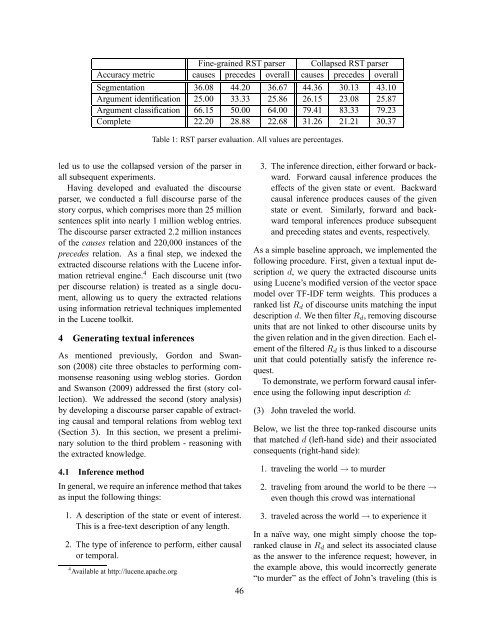W10-09
W10-09
W10-09
You also want an ePaper? Increase the reach of your titles
YUMPU automatically turns print PDFs into web optimized ePapers that Google loves.
Fine-grainedRSTparser CollapsedRSTparser<br />
Accuracymetric causes precedes overall causes precedes overall<br />
Segmentation 36.08 44.20 36.67 44.36 30.13 43.10<br />
Argumentidentification 25.00 33.33 25.86 26.15 23.08 25.87<br />
Argumentclassification 66.15 50.00 64.00 79.41 83.33 79.23<br />
Complete 22.20 28.88 22.68 31.26 21.21 30.37<br />
ledustousethecollapsedversionoftheparserin<br />
allsubsequentexperiments.<br />
Having developed and evaluated the discourse<br />
parser, weconducted afull discourse parse of the<br />
storycorpus,whichcomprisesmorethan25million<br />
sentencessplitintonearly1millionweblogentries.<br />
Thediscourseparserextracted2.2millioninstances<br />
ofthecausesrelationand220,000instancesofthe<br />
precedes relation. Asafinalstep, weindexedthe<br />
extracteddiscourserelationswiththeLuceneinformationretrievalengine.<br />
4 Eachdiscourseunit(two<br />
perdiscourse relation) istreated asasingle document,<br />
allowing us to query the extracted relations<br />
usinginformationretrievaltechniquesimplemented<br />
intheLucenetoolkit.<br />
4 Generatingtextualinferences<br />
As mentioned previously, Gordon and Swanson(2008)citethreeobstaclestoperformingcommonsensereasoningusingweblogstories.<br />
Gordon<br />
andSwanson(20<strong>09</strong>)addressed thefirst(storycollection).<br />
Weaddressedthesecond(storyanalysis)<br />
bydevelopingadiscourseparsercapableofextractingcausalandtemporalrelationsfromweblogtext<br />
(Section 3). Inthissection, wepresent apreliminarysolutiontothethirdproblem-reasoningwith<br />
theextractedknowledge.<br />
4.1 Inferencemethod<br />
Ingeneral,werequireaninferencemethodthattakes<br />
asinputthefollowingthings:<br />
Table1:RSTparserevaluation.Allvaluesarepercentages.<br />
1. Adescriptionofthestateoreventofinterest.<br />
Thisisafree-textdescriptionofanylength.<br />
2. Thetypeofinferencetoperform,eithercausal<br />
ortemporal.<br />
4 Availableathttp://lucene.apache.org<br />
46<br />
3. Theinferencedirection,eitherforwardorbackward.<br />
Forwardcausal inference produces the<br />
effectsofthegivenstateorevent. Backward<br />
causalinferenceproducescausesofthegiven<br />
state or event. Similarly, forward and backwardtemporal<br />
inferences produce subsequent<br />
andprecedingstatesandevents,respectively.<br />
Asasimplebaselineapproach,weimplementedthe<br />
followingprocedure.First,givenatextualinputdescription<br />
d,wequerytheextracteddiscourseunits<br />
usingLucene’smodifiedversionofthevectorspace<br />
modeloverTF-IDFtermweights. Thisproducesa<br />
rankedlist Rdofdiscourseunitsmatchingtheinput<br />
description d.Wethenfilter Rd,removingdiscourse<br />
unitsthatarenotlinkedtootherdiscourseunitsby<br />
thegivenrelationandinthegivendirection.Eachelementofthefiltered<br />
Rdisthuslinkedtoadiscourse<br />
unitthatcouldpotentially satisfy theinference request.Todemonstrate,weperformforwardcausalinferenceusingthefollowinginputdescription<br />
d:<br />
(3) Johntraveledtheworld.<br />
Below,welistthethreetop-rankeddiscourseunits<br />
thatmatched d(left-handside)andtheirassociated<br />
consequents(right-handside):<br />
1. travelingtheworld →tomurder<br />
2. travelingfromaroundtheworldtobethere →<br />
eventhoughthiscrowdwasinternational<br />
3. traveledacrosstheworld →toexperienceit<br />
Inanaïve way, one mightsimply choose the toprankedclausein<br />
Rdandselectitsassociatedclause<br />
astheanswertotheinferencerequest; however,in<br />
theexampleabove,thiswouldincorrectlygenerate<br />
“tomurder”astheeffectofJohn’straveling(thisis


